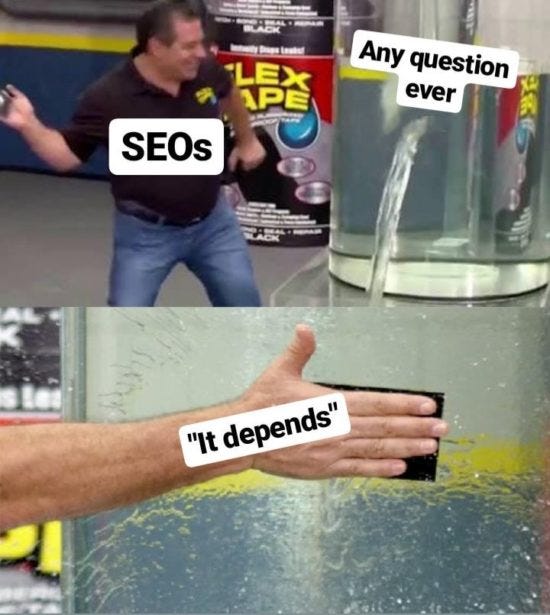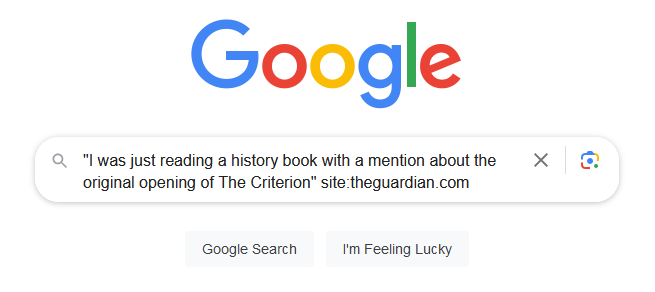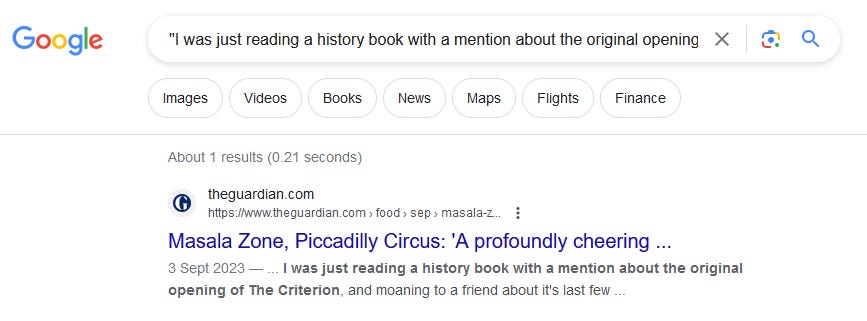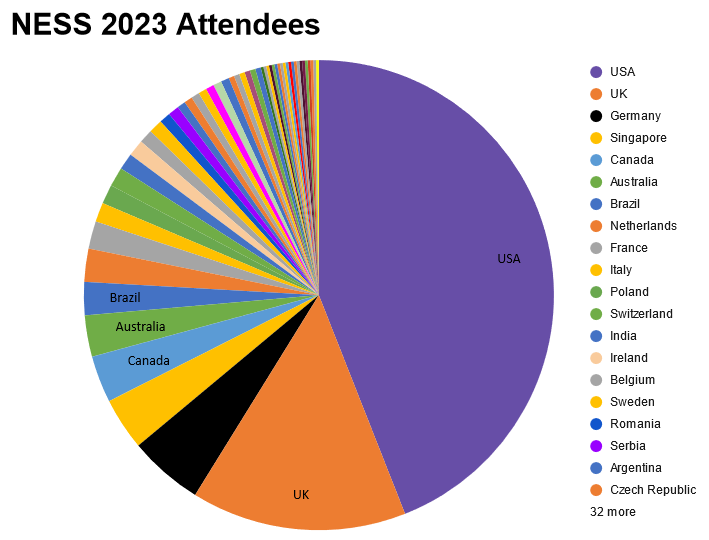SEO for Google News - The Impact of Article Comments on SEO
The Impact of Article Comments on SEOAllowing readers to post comments and contribute to your site is great for engagement and loyalty, but does come with some SEO repercussions.For this newsletter I’d intended to write about Discover, collecting everything I know about maximising visibility in Google’s personalised recommendation feed. As part of that process I reached out to Lily Ray, who is one of the industry’s true experts on all things Discover. Turns out she had an article in the works about Discover, which has now been published on Moz with the title How to Drive Traffic in Google Discover: The Ultimate Guide. And yes, it’s an ultimate guide. It covers everything I wanted to cover and loads more. So for now I don’t need to write about Discover, as Lily’s piece is quite simply the definitive piece on that topic. So instead I moved on to the next topic on my list, which is an area I get many questions about whenever I deliver training for clients: user-generated content, and specifically comments underneath articles. UGC is intrinsic to the webUser-generated content (UGC for short) has been a staple of the internet since the beginning. From bulletin boards to guestbooks and comments, the internet and the web have always allowed users to post and participate in various ways. On the modern web, UGC is everywhere: comments, Q&As, forums and bulletin boards, guest articles, wikis, reviews - UGC comes in an endless variety of flavours. Social media platforms are pretty much entirely UGC. Sites like Reddit and Quora are built on the contributions of their audience, with (almost) all their content generated by their users. Every page on Wikipedia is a combined effort from thousands of volunteers. Essentially, UGC is open source for the web’s content. UGC can serve as a deliberate tactic to generate vast amounts of content - which can rank in Google and drive traffic to the website - with relatively little effort. Instead of having to pay journalists and writers, you can just outsource the production of content to your audience. The biggest risk is the potential abuse of UGC for unsavoury purposes. Oversight is required, which means you still need to invest in moderation resources to safeguard the quality of your site’s UGC. For the purpose of this newsletter, I’ll focus on the most common form of user-generated content on publisher sites: reader comments underneath articles. Can Google see comments?The first question I get asked most often is ‘can Google see comments’? And the answer is, it depends.
You can easily test if Google can ‘see’ comments on your site. Simply copy a sentence from one of your user comments, paste it in a Google search in double quotes, and add the An example: This query is looking for a specific sentence from a comment on this article, and indeed Google shows it: You may need to try snippets from comments on several different articles, and should always select articles that are at least a few weeks old. For Google to see and index comments, it usually needs to render pages as part of its tiered indexing process. The rendering phase of content is often delayed - it can take weeks for Google to fully render a newly published webpage. So pick an old(ish) article that was relatively popular (so has a higher probability of being rendered), copy a snippet from a top comment underneath the article, paste it in a Google search box with quotes, and use the If Google shows the article the comment belongs to, then yes Google indexes your comments. Should Google see comments?When we’ve answered the first question, the logical follow-up question is whether Google should be able to index comments. And, again, it depends. Google has confirmed that it sees comments as part of the webpage’s content. In fact, Google has gone on record to say they like seeing comments. In the words of Google’s John Mueller:
I’ve had this experience myself, where one of my blog posts ranked top in Google results for a specific query that appeared only in the comments and not in the actual piece: When I migrated my site to a new platform I chose not to migrate the comments across, and as a result I lost this particular ranking (which I’m genuinely a bit sad about). But this also brings up a second point: Not all comments add value. If you moderate your comments closely, you can ensure the published comments adhere to minimum standards and avoid spam, abuse, and profanity. With good moderation practices, it’s definitely worth allowing Google to index your comments as these can add value and enable broader rankings for your article in Google’s ‘ten blue links’ evergreen rankings. However, if you have imperfect (or no) moderation, or your comment section has a certain community culture that features language which may be interpreted as abusive and profane, it might be safer to make your comments invisible for Google. I have seen websites suffer from algorithm updates when their comment sections had specific features that were acceptable within the cultural norms of that site’s community, but to outsiders could appear to be abusive and harmful. Google prefers to err on the side of caution. When Google sees an abundance of content on a site that could be interpreted as harmful, it can downgrade that website’s visibility in its search results - including in Top Stories if it’s a news publisher. So you’ll have to take an objective look at the comments underneath your articles, and judge whether they’re acceptable for a broad audience. If the answer is ‘maybe not’, you should consider removing your comments from Google’s sight. How can I block my comments from Google?Which brings us to the third question: How can Google be prevented from seeing the comments on your site? The answer is, you guessed it… it depends. Blocking Google from indexing comments is a technical issue. The best approach depends on how your site has implemented its comments function. A common approach is to load comments through JavaScript. When specific JS files need to be loaded for your comments to appear on your articles, you could prevent Google from loading those JS files by blocking them with a robots.txt disallow rule. For example: Some websites load comments with a separate URL attached to an article, for example with a URL parameter added to the article URL or in a subfolder (like Substack’s comment function) . These too can be blocked in robots.txt: Alternatively, if your comments are on a separate URL you can add a noindex meta tag to this URL to prevent Google from indexing them: If your comments are implemented on your site with a hashed URL, for example If Google indexes your comments, you may need to change how comments are implemented on your site to enable a specific blocking mechanism. Some sites use a third-party comments feature like Disqus. I’m generally not a fan of those: Not only are such external comment features often terribly slow and have a negative impact on your site’s core web vitals, they can also come with additional problematic ‘features’. The only upside is that, by virtue of trying to hide their footprint from Google, 3rd party comment features frequently make themselves unindexable for search engines. I’m not sure that payoff is worth it, though. Comments and CrawlingSo far I haven’t discussed an additional aspect to consider with comments: How it impacts Googlebot’s crawling of your site. Once again, this depends on exactly how comments have been implemented. Some websites generate a unique URL for every comment that is posted. This could create enormous amounts of new URLs for Googlebot to discover, crawl, and potentially index. This represents a potential crawl waste issue, and adds an additional element to your SEO considerations. If you’re finding that Google is spending an inordinate amount of crawl effort on comment URLs, you could consider blocking Googlebot from your comments with aforementioned robots.txt disallow rules or a similar mechanism. Comments on CommentsIf you have any thoughts of your own on the value of comments and how you would approach it, please leave a comment. ;) NESS 2023 Wrap-UpThe third annual News and Editorial SEO Summit was held last month on October 11th and 12th, and I’m proud to say it was another smashing success. We had 546 registered attendees, of which 490 joined the live event at various stages.
The ever-awesome Jessie & Shelby have written roundups of both days of the conference, which you can read on their excellent WTF is SEO? website: We’re already planning the 2024 edition and have dates reserved: October 29th & 30th 2024. Save the dates in your calendar and keep an eye on the NewsSEO.io website for details. MiscellaneaAs usual I’ll end with a roundup of the most interesting updates, resources, and stories since the last newsletter. Official Google Docs:
Interesting Articles:
Latest in SEO:
That’s it for this edition. Thanks for reading and subscribing, and I’ll see you at the next one! If you liked this article from SEO for Google News, please share it with anyone you think may find it useful. |
Older messages
Why Articles Should Be Optimised Before Publishing
Wednesday, October 4, 2023
One of Google's quirks means that once an article has been crawled and indexed, any changes won't necessarily be picked up by Google until it's too late.
Advanced Insights into Googlebot Crawling
Thursday, July 27, 2023
Here are some interesting aspects of Googlebot's crawling of news websites that are useful to know when you want to optimise crawl efficiency.
The News & Editorial SEO Summit 2023
Monday, July 24, 2023
Our unique NESS event is coming back for its third year on 11 & 12 October with another excellent roster of expert speakers from SEO and publishing.
The 5 Article Headlines Google Cares About
Tuesday, May 2, 2023
Did you know that an article can have up to five headlines that each play a different role in Google's ecosystem? This edition will explain it all.
Integrating SEO into the Newsroom
Wednesday, April 5, 2023
This is a special guest edition of SEO for Google News, where Jessie and Shelby from WTF is SEO write about integrating SEO into newsrooms.
You Might Also Like
eBook & Paperback • Demystifying Hospice: The Secrets to Navigating End-of-Life Care by Barbara Petersen
Monday, March 3, 2025
Author Spots • Kindle • Paperback Welcome to ContentMo's Book of the Day "Barbara
How Homer Simpson's Comical Gluttony Saved Lives
Monday, March 3, 2025
But not Ozzie Smith's. He's still lost, right?
🧙♂️ Why I Ditched Facebook and Thinkific for Circle (Business Deep Dive)
Monday, March 3, 2025
Plus Chad's $50k WIN ͏ ͏ ͏ ͏ ͏ ͏ ͏ ͏ ͏ ͏ ͏ ͏ ͏ ͏ ͏ ͏ ͏ ͏ ͏ ͏ ͏ ͏ ͏ ͏ ͏ ͏ ͏ ͏ ͏ ͏ ͏ ͏ ͏ ͏ ͏ ͏ ͏ ͏ ͏ ͏ ͏ ͏ ͏ ͏ ͏ ͏ ͏ ͏ ͏ ͏ ͏ ͏ ͏ ͏ ͏ ͏ ͏ ͏ ͏ ͏ ͏ ͏ ͏ ͏ ͏ ͏ ͏ ͏ ͏ ͏ ͏ ͏ ͏ ͏ ͏ ͏ ͏ ͏ ͏ ͏ ͏ ͏ ͏ ͏ ͏ ͏ ͏ ͏
I'd like to buy Stripe shares
Monday, March 3, 2025
Hi all, I'm interested in buying Stripe shares. If you know anyone who's interested in selling I'd love an intro. I'm open to buying direct shares or via an SPV (0/0 structure, no
What GenAI is doing to the Content Quality Bell Curve
Monday, March 3, 2025
Generative AI makes it easy to create mediocre content at scale. That means, most of the web will become mediocre content, and you need to work harder to stand out. ͏ ͏ ͏ ͏ ͏ ͏ ͏ ͏ ͏ ͏ ͏ ͏ ͏ ͏ ͏ ͏ ͏ ͏
mRNA breakthrough for cancer treatment, AI of the week, Commitment
Monday, March 3, 2025
A revolutionary mRNA breakthrough could redefine medicine by making treatments more effective, durable, and precise; AI sees major leaps with emotional speech, video generation, and smarter models; and
• Affordable #KU Kindle Unlimited eBook Promos for Writers •
Monday, March 3, 2025
Affordable KU Book Promos "I'm amazed in this day and age there are still people around who treat you so kindly and go the extra mile when you need assistance. If you have any qualms about
The stuff that matters
Sunday, March 2, 2025
Plus, how to build a content library, get clients from social media, and go viral on Substack. ͏ ͏ ͏ ͏ ͏ ͏ ͏ ͏ ͏ ͏ ͏ ͏ ͏ ͏ ͏ ͏ ͏ ͏ ͏ ͏ ͏ ͏ ͏ ͏ ͏ ͏ ͏ ͏ ͏ ͏ ͏ ͏ ͏ ͏ ͏ ͏ ͏ ͏ ͏ ͏ ͏ ͏ ͏ ͏ ͏ ͏ ͏ ͏ ͏ ͏ ͏ ͏ ͏
Food for Agile Thought #482: No Place to Hide from AI, Cagan’s Vision For Product Teams, Distrust Breeds Distrust
Sunday, March 2, 2025
Also: Product Off-Roadmap; AI for PMs; Why Rewrites Fail; GPT 4.5 ͏ ͏ ͏ ͏ ͏ ͏ ͏ ͏ ͏ ͏ ͏ ͏ ͏ ͏ ͏ ͏ ͏ ͏ ͏ ͏ ͏ ͏ ͏ ͏ ͏ ͏ ͏ ͏ ͏ ͏ ͏ ͏ ͏ ͏ ͏ ͏ ͏ ͏ ͏ ͏ ͏ ͏ ͏ ͏ ͏ ͏ ͏ ͏ ͏ ͏ ͏ ͏ ͏ ͏ ͏ ͏ ͏ ͏ ͏ ͏ ͏ ͏ ͏ ͏ ͏ ͏ ͏ ͏
Pinterest For Authors 📌 30 Days of Book Pins 📌 1 Each Day
Sunday, March 2, 2025
"ContentMo is at the top of my promotions list ... "I'm amazed in this day and age there are still people around who treat you so kindly and go the extra mile when you need assistance. If





